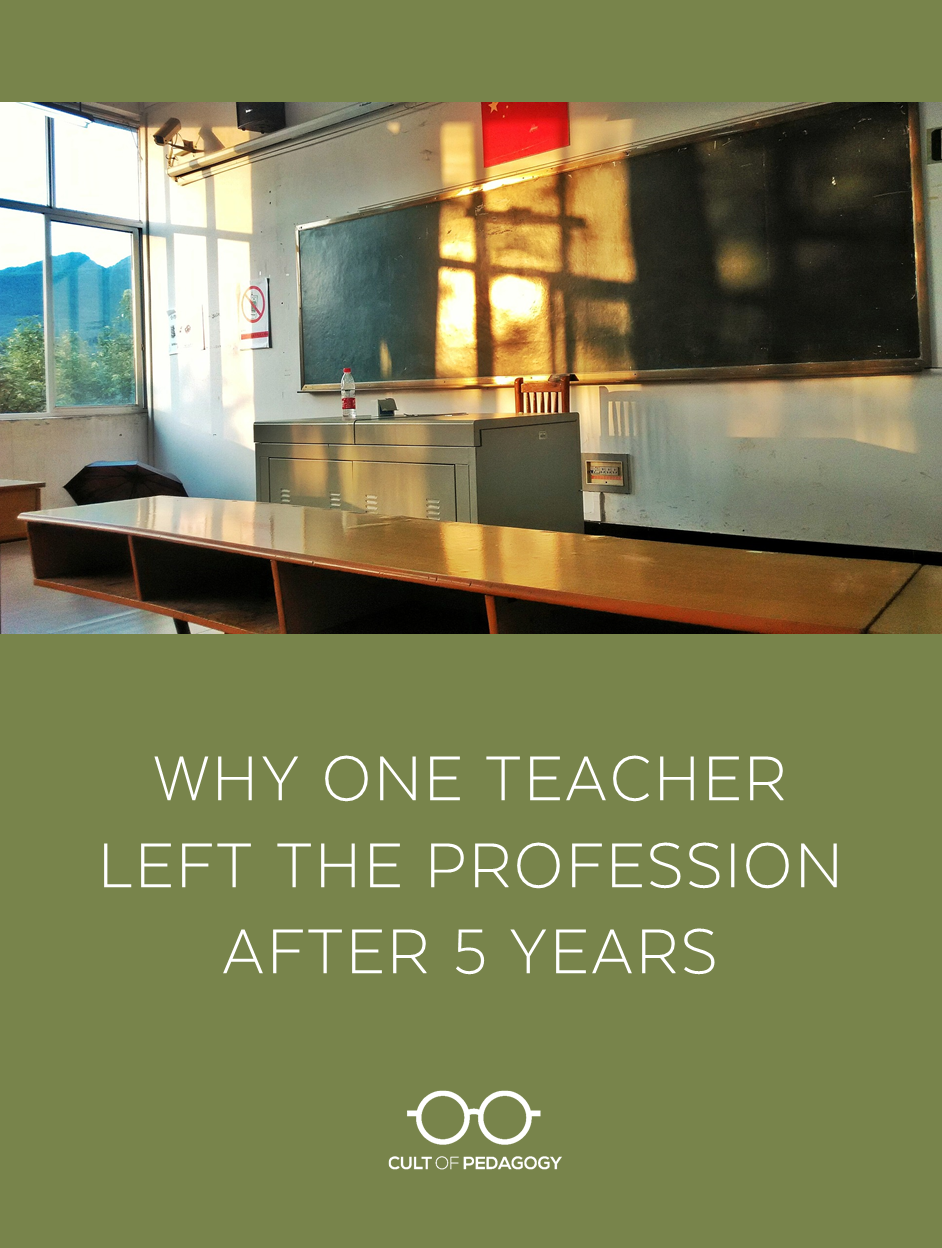
“The first thing people say to me when I tell them I don’t teach any more is Was it because of the kids? No. Was it because of the parents? No. Never has it been about the kids or the parents.”
What makes teachers leave?
Episode 2 is an interview with Carrie, who taught for over 5 years in various elementary schools before leaving teaching to pursue a different profession. With about half of all teachers choosing other careers within the first five years, Carrie’s story offers us a closer look at how, and why, it happens.
Stay in touch.
Join my mailing list and get weekly tips, tools, and inspiration all geared toward making your teaching more effective and fun. You’ll also get access to my members-only library of free resources, including my e-booklet, 20 Ways to Cut Your Grading Time in Half, which has helped thousands of teachers spend less time grading!
Join my mailing list and get weekly tips, tools, and inspiration all geared toward making your teaching more effective and fun. You’ll also get access to my members-only library of free resources, including my e-booklet, 20 Ways to Cut Your Grading Time in Half, which has helped thousands of teachers spend less time grading!





I believe this is such an important podcast. The frustrations Carrie felt toward the profession are the same that I hear voiced over and over by others in this field. I found myself nodding my head as Carrie described her pre-service teaching fantasies of setting up her own classroom and saving the world one child at a time. On the last day of my student teaching experience, my cooperating teacher said that I had waltzed into her classroom the first day of that semester with stars in my eyes. Her parting words included a blessing that despite the frustrations and letdowns I would inevitably experience, I would never lose that optimism about our chosen profession.
I learned quickly that education is not the magical world I envisioned. Like Carrie, I spent many hours observing in classrooms of my favorite teachers. Though heartwarming and inspiring, those were not the authentic experiences I needed to be fully prepared. I completely agree with Carrie’s notion that more of our pre-service hours would be better spent in classrooms. So much of that time was devoted to perfecting lesson plans, writing discussion board posts about literacy strategies, or taking pointless online quizzes about exceptional education acts. New teachers might be less overwhelmed if more of their preparation included implementing lesson plans chalked full of research-based instructional strategies and participating more in the daily routines of classrooms. It would take a load of stress off new teachers just to start their first year with a solid understanding of the 1,000,000 acronyms used in education!
I suppose what I’m getting at, and what I think Carrie was trying to say, is that administrators need to be aware of this problem because we’re headed in a direction in which we’re going to lose some of our best and brightest because of the impossible demands of the job. I agree with Carrie that it starts with a good mentor. A new teacher, or any teacher for that matter, cannot survive without a positive support system of people who understand the demands of the job, the frustrations of the job, and the pure joys of the job. This makes me especially happy to be part of the Cult of Pedagogy!
Ditto to Jackie Green! All of those 1,000,000 acronyms are called “teachinese” to me 🙂
Carrie was right in saying it’s not the kids, and it’s not the parents that force all kinds of smart, enthusiastic, new teachers to tap out. I think it’s pretty safe for me to say that people going into education KNOW that they will deal with difficult kids and parents. It’s all of the extra unforeseen, dare I say, “crap” that teachers deal with that there is no way to learn in our college years.
We have no idea when we take our first teaching job how little of our “planning” will actually be used for planning (in my world, that’s a big goose-egg). We have no idea REALLY how much time during the week we will work after school planning (because we don’t have enough time during out “planning”) and grading papers. We also have no idea what a new school’s culture could be like and whether or not we will be supported, because, until this point, we’ve been really good at “playing school” and being the student. We’ve always been supported.
Now, we’re looking at education from the other side of the spectrum and slowing gaining an understanding that we’re being asked to do a never-ending, ever-changing, impossible to perfect task.
How can we fix this? Well, there’s not an easy answer for that. I have seen some school systems go through new hire orientations and trainings to show them the ropes of that particular district. Some new hire trainings will board all of the new hires onto a bus and drive them around to place their students live. I think this is a step in the right direction for administrations.
All I can say after listening to this podcast is that it is a very good thing that this young woman has left the teaching profession. I think she will be very well suited to the profession she is going to school for – dental hygiene – because in that profession, you go to work for a specific number of hours, you are paid very well and you go home and you are done – you leave your job at your job. She obviously didn’t have a realistic understanding of what a teacher does. That was evident in the very first things she said in this interview – the reasons she gave for going into teaching…her husband-to-be was going to be a teacher, summers off, etc. I heard a lot of the blame game going on and whining for her own unhappiness. She is young, she will hopefully find a place where she is “happy” and feels fulfilled. Thanks for posting this podcast, it was interesting and enlightening, but the feeling that was strongest in my mind at its completion is relief that Carrie is no longer teaching my kids. There are so many hard-working, dedicated teachers that go above and beyond the call of duty who deserve way more recognition and salary than they are given, so I will close by saying a great big “THANK YOU” and “God bless you!”
Hi Diane,
Thanks for contributing. I agree that Carrie went into teaching with some misconceptions about what it would be like — this is one of the reasons I think this interview would be useful for people thinking about entering the profession. It may give some people a moment of pause if they have similar beliefs about what it will be like. On the other hand, I have known a lot of incredibly dedicated, hard-working teachers who reach the same point of despair, where they feel like all they do is work and work, but most of that work is on the administrative end — documenting teaching practices, analyzing data, more documentation, more meetings, but very little of it goes into their actual teaching. And with so many schools changing programs and initiatives every couple of years, there’s never enough time to see if one initiative actually works.
Again, I do think Carrie made the right decision for herself. But some valuable lessons about school culture and teacher workload can be learned here that can help us hang on to the people who are right for the job.
Thanks again for posting — I would love to hear your thoughts on some other posts as well!
Hi!
I just stumbled across your podcast yesterday, and the title of this episode caught my attention. After listening, I have to say that I really appreciate you shedding light on the importance of teacher preparation programs. As I listened to Carrie’s story, I found it super interesting how polar opposite our student teaching experiences were. Mine was extremely intensive. Getting into the teaching intern program was competitive and not a guarantee, simply because it was your major. If you met the requirements to begin education classes, you were placed with a teacher for the entire year. I was with one mentor teacher from her first inservice day in August until the last teacher day in May. I went to every staff meeting, PD, planning meeting, data chat, etc. I was observed frequently by professors, the school’s principals, and other teachers in the building. Carrie and I were prepared for the same job with very different methods.
What’s the most interesting to me about this is that even after all of that, disillusionment still hit me pretty hard. I’m in the midst of my 5th year of teaching now, but I almost didn’t stay. I credit the strong mentor relationships I made through my university, as well as the rigor of my program. The prep you get makes a big difference in how strong of a teacher you can be early on, but I think it makes the biggest difference in how willing you are to stick it out and find the positive in the daily grind.
Thanks for the episode!
I am going into my second year of college, during my first year I switched my major from Music Ed to Elemntary Ed. At my college during January of students first year all the students who want to do any type of education spend four days a week in a classroom (We spend all day in the classroom) and in Fridays have a seminar at the college. We were encouraged not only to observe but to get involved and be engaged in the class (at the time I was a music ed major and I even got to teach private/group lessons and lead warm ups ). This is the first class from the education department that most education majors/minors take and js taken during our first year so that we know if teaching is really for us. After listening to this podcast I am grateful that my school does this so that we get a better idea of what it is like to be a teacher. Thank you for making this podcast! It’s helping me think more about the profession in a different way and is helping me examine if this profession really is for me.
God bless Carrie for her honesty! I’ve felt terrible for years because I was a failure at teaching Title I kids in a very rough neighborhood. It was the only job I could get as a newly- credentialed teacher, but new teachers need stable settings with help to get their sea-legs under them. I quit after one year and I told the district in my exit interview that I would never teach anywhere ever again. I was traumatized. Carrie helped me feel better about the challenges I faced and how even a little bit of support from my principal would have made a difference.
Hi, Cynna! I work for Cult of Pedagogy, but I want to respond as a teacher. I recently taught in a Title I school…for a very short nine weeks. It was killing me. I felt like a failure, too, but this post along with Angela Watson’s article Why I quit my teaching job mid-year (no, it wasn’t the testing) helped me through it. Angela’s post does focus on quitting mid-year, but you may find some comfort in it as well.
I was very upset listening to this podcast about title one schools. I work in a title 1 school in California and the kids deal with real life trauma and they bring it with them into class. Teachers should have compassion, empathy and understanding. Let’s start a conversation about teachers being taught social emotional strategies, and trauma strategies in the classroom. We have the best job, teaching these kids, being with them as one of their constant adults in their lives. Title 1 schools get a negative reputation, and they are still children and deserve the same education as any other with a little more understanding.
Hi Paige! I work for Cult of Pedagogy and we’d like to address your concern. Could you please be a little more specific about the part(s) of the podcast that bothered you? Jenn doesn’t recall having anything overtly negative said about Title 1 schools in the interview. Thanks!
Hi Holly,
I noticed some of the descriptions of students and their behaviors beginning around 18:45 had a deficit-tone.
“There was a few kids that would literally lose it and just lose control in class you know scream and fight ya and kick ya and stuff like that and that’s the sort of thing that went on there… That was the sort of thing you had to work with.
I don’t doubt the truth of Carrie’s statements. And none of her comments were overtly critical of Title 1 schools. It does seem, however, that at that point in her career Carrie viewed students’ misbehaviors as something that created difficulties for the teachers and less as indicators of students’ needs or pointers to something that the school could help with. I know it’s really hard to help troubled kids, and if Carrie (maybe picking up on her colleagues?) felt like their misbehaviors in class were getting in the way of her real work, I can see why she would want to be out of the classroom after that year.
Paige, you may enjoy the Cult podcast on restorative justice from earlier this year.
This interview really made me think about reaching out to the newer teachers and making sure they’re okay. Sometimes I am just so busy getting things done and out the door that I forget to check in with other teachers.
I guess I am late to the party but I listened to this episode yesterday and this morning and what came to mind is how unprepared for life this poor girl was. Her incessant whining was like listening to nails on a chalkboard. The reason she probably had a hard time connecting was probably due to the other folks finding her as annoying as I did. Yes, it is tough sometimes, but if your personal happiness is based upon other people liking you, plan for a very unhappy adulthood.
That said, when looking at the population of teachers who leave after 5 years, has anyone broken this down by teachers who entered out of college and teachers who came into teaching after a career outside of education?
Coming into teaching after a career in the military and government contracting has given me a unique perspective on what it means to be a professional.
What I have seen in education is very little support for new teachers. We are very good at eating our young. Outside of education, new folks are expected to perform at the level of experienced folks. In teaching, it seems as if new teachers are expected to perform at the level of experienced teachers. It is a formula for disaster and it plays out with the attrition rate.
It also reminded me of how good we are at eating our young in education and why I would have hated teaching when I was a 22-year-old college graduate.
Well, I know her personally and never once thought of her as a whiner. I’m glad you recognize the lack of support for new teachers as a major factor in all of this.
Just based upon how she sounded in the podcast Clearly, she had a unique introduction to teaching but didn’t really spend that much time managing her own classroom before deciding to leave.
I could not have done it straight out of college.
Good learning
Welp. Here I am, a senior and ChildEd major getting ready to start student teaching next semester… During this time of Remote School and Virtual Learning amid the COVID-19 pandemic, I am honestly unsure of what to expect as far as my future teaching career! I went into this, knowing basically from the start, that Teaching is a notoriously underpaid, undervalued profession. I constantly hear about how much the job sucks – as well as how personally rewarding and inspiring it is for some! Still, I’d imagine for me that most career options would have this problem. The day-to-day grind is tough! And I can’t imagine myself doing anything else. Teaching is something I can visualize, at least (prob not a great reason TBH).
I’m glad I listened to this podcast. As a preservice teacher, I have plenty of doubts. I hope my experiences student-teacher, most likely in a hybrid model if it happens within the next year, will help me become more secure in my decision – to continue pursuing this or even to find another path.
I know that I love learning, I love kids, I love helping people feel like they can get it (learn stuff, do stuff, figure it out!), and encouraging curiosity.